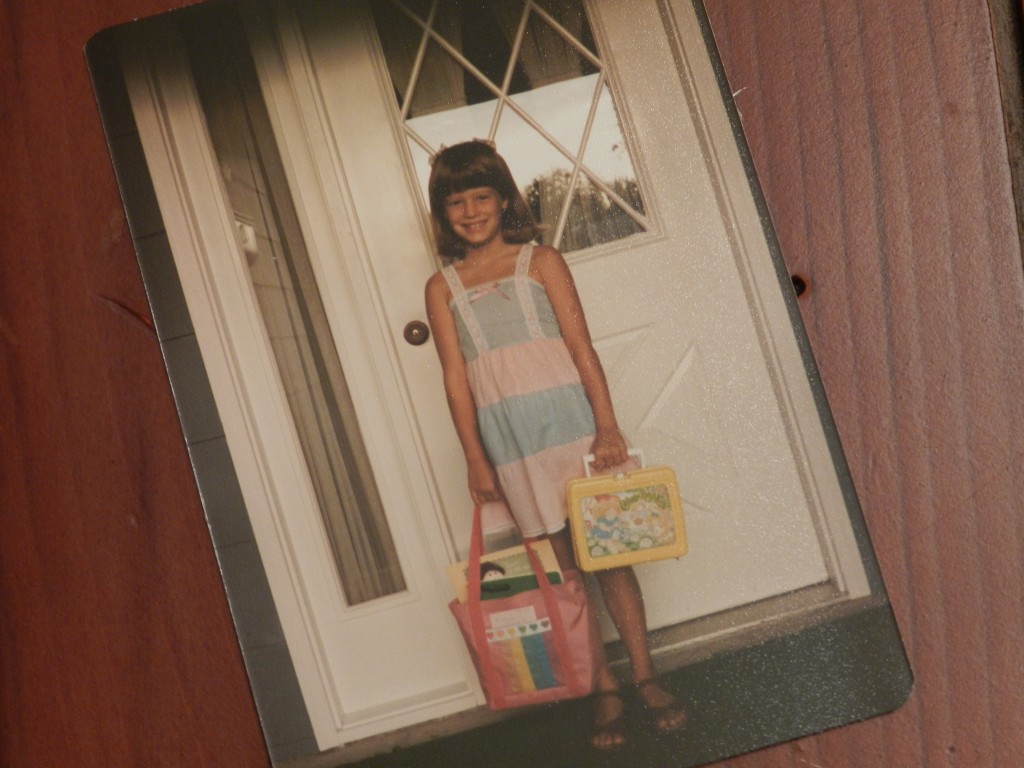I’ve spent a lifetime battling perfectionism – doing what’s right, doing what’s best, doing what’s expected. Just this week, I squelched my own creativity by ruminating on perfection. Blog posts swirled in my head. I drafted three in three days. But I couldn’t bring myself to publish any of them. Because I had worries about each one – what if I’m sharing too much with this one, what if I’m being too vague with this one, what if nobody relates to this one? So I dug deep in my unpublished archives and found this post, originally drafted in August 2013. It provides insight into the origins (and persistence) of perfectionism in my life. While these incidences merely skim the surface in regards to how perfectionism plays out in my life on a daily basis, they are most definitely defining moments. Today, I hope this post will help you recognize you’re not alone in whatever battle you’ve been facing for a lifetime.

My first memory of striving to be my best was in first grade. Sara and I were the top two in a contest to see who could read the most books. For each book we read, we got to add a body to our caterpillar. Whoever had the longest caterpillar at the end of the contest was the winner. I remember the contest and I remember the caterpillar up on the wall above the chalkboard, but the funny thing is, I don’t remember who won. It was all about reading more, doing more, being more.
Third grade marks my first recollection of being reprimanded for trying my best. My teacher was wonderful and highly respected. She had high expectations for her students. It was time for a spelling test, and I wasn’t sure how to spell a word. I distinctly remember spelling the word out in the corner of the paper in small writing, trying to figure out which letters fit together best before I wrote the word in its final form next to its designated number on the test. As my teacher walked around our desks, she noticed the faint, erased word on the top of my paper, and I’ll never forget her questioning whether I had cheated. This is most definitely a formative memory. I’d tried my best, yet my best wasn’t good enough.
The pressure to perform must have been on in fourth grade. Mom was a first grade teacher at the time, but had an advanced student who was working at the fourth grade level. I had a particularly difficult reading and writing assignment, and must have known mom had the teacher’s manual with all the answers. I don’t have any recollection of cheating, but I do remember being caught. My teacher called me on my far-too-advanced-for-my-age choice of words, and she was right.
The competition between me and Sara continued in fifth grade, sixth grade, and beyond as we battled for first chair in band. We played flute like it was our business, as if our lives were much more worthy because we were sitting in first chair instead of second.
In seventh grade, a peer criticized the way I drank my can of soda pop. She said I touched my lips too much to the can as I drank, and according to her, I was supposed to tip the can up slightly and just let the soda flow into my mouth. I’m pretty sure I overanalyzed the way I drank soda pop from a can for years.
In high school, someone called me on my pronunciation of sorry. “You’re not supposed to say SOOOORY,” they said, “you’re supposed to say “saaarry.” You bet, I never said “soooory” that way ever again.
I’ve always been one to dress up more than most, but in high school, a peer called me on it one day. “Why do you wear tights with shorts,” she said, “that looks dumb.” I didn’t have an answer, really. All I knew was I had bought the outfit at Express. They were showing tights with shorts at that time, and I thought it was cool. So, hey? I didn’t understand why she had to be so critical.

You’d think all of this would’ve come to an end after high school, but not so much.
In graduate school, I’d prepared a long paper for a course. It was tough and required a lot of research. I wasn’t 100% confident or passionate about the subject matter, to be honest. But I had done a LOT of work, and I did my very best. I felt the paper was perfectly acceptable. The next task was to present the paper orally in front of the class. I don’t remember much about that presentation, but I do remember the professor stopping me abruptly in the middle of it. “I think we’ve heard enough for today,” she said. The message was clear – you’ve said too much, you’ve gone into way too much detail, we don’t need to hear any more of this. I’m not sure if I left the room right away or if I waited politely until the appropriate time to leave, but I remember fleeing down the hall, hiding away, sobbing in the bathroom.
Last summer, a grown woman made me feel like a 7-year-old instead of a 37-year-old when I was simply following my husband’s suggestion to organize a group of adults and children. I was tired and overstimulated, and I was just trying to do the right thing in that moment, but her poor choice of words and condescending, shaming tone brought me all the way back to 3rd grade in a second. She shut me up and shut me down, that’s for sure.
And later that summer, when I made homemade scalloped potatoes and ham, warmed up a bag of frozen mixed vegetables, put it on the kids’ plates and they said “that’s all we’re having for dinner?” I second guessed myself. I should’ve made pork chops and scalloped potatoes, then there would’ve been a bigger piece of meat and more protein. I should’ve cut up some fruit so they had all the food groups represented. And we were out of milk, so they just had ice water. Clearly, I wasn’t organized enough to get to the store to buy milk today. And that night at the store, guilt as I passed up the organic gallon of milk for the much cheaper $2.89 gallon of store brand milk.
Do you see the pattern here?
Do you see the problem with all of this?
My expectations are faulty, others’ expectations are faulty.
My thinking is faulty, others’ thinking is faulty.
My response is faulty, others’ responses are faulty.
Let’s just face it. The belief that perfection can be obtained, achieved, is a bunch of rubbish.
My pursuit of perfection, my need to try my very best and do my very best, at all times, in all ways, thinking I need to be all things to all people, yet still never feeling like I’m good enough? It’s not working for me anymore. It’s not healthy, it’s not sustainable, and it’s not the way God calls me to live. Because no human being is perfect, no human being can do everything right.
So I’ve had enough. I’m not perfect, nor will I ever be.
I embrace grace with wild abandon, because I need it bad.
Grace for myself, grace for others.
Grace it will be.
Amy
*Please note, this post is not intended to shame any individual who’s been a part of my formation as a human being, but rather to shed light on my personal battle with perfectionism.
His Grace is enough! None of us are perfect and YOU are a wonderful person!
Oh how I wish I didn’t struggle with this! From your writing it brought up things in my past as well that have shown my perfectionism tendencies. Right now I am really trying (and struggling!) to not pass that along to my daughters. I have to daily remember to bite my tongue and be ok with things not being perfect (they never will be anyway!) and I have to stop harping on them for not brushing their hair nice or saying, “oh you got all A’s and one A-, what happened in that class?” UGH, that just happened today and I regretted it the moment it came out of my mouth! Why didn’t I praise her for doing her best work instead of focusing on a stupid A-? So not only do I worry about my own perfectionism, but I constantly have to remember to not let that affect my daughters. Grace! I need to remember Grace! Thanks
Amy, we grew up in a world of “trial and error”. Re-worded ~ try and fail! No grace, just “ok” or “FAIL!!!!” Or at least it seemed that harsh. Your blog seemed to hear too “harsh”. It is hard to work with people to foster growth and confidence without shaming or demeaning honest effort. If we demand perfection, we do not realize our demand is flawed because my perfection is going to naturally look different from yours.
Throughout my study of Christ and teaching, I have realized that walking along side one in a relationship tends, to me, to be more supportive. Others do not always agree with this lack of definite leadership!
Love and nurture are so important. Acceptance of what is is hard. And, perfection becomes a plateau along a climb that never seems to have a top.
Thanks for your blog. Thanks for your time.
Bob
Bob, love to hear your thoughts on this. You’re right on the “harsh” feeling.
Particularly love a couple things you said in your comment.
“If we demand perfection, we do not realize our demand is flawed because my perfection is going to naturally look different from yours.” WOW, SO TRUE.
And this…”Perfection becomes a plateau along a climb that never seems to have a top.” THAT IS PROBABLY ONE OF THE MOST BRILLIANT STATEMENTS I’VE EVER READ ABOUT “PERFECTION.” THIS IS EXACTLY HOW I FEEL. I ABSOLUTELY NEVER ATTAIN PERFECTION LIKE I THINK I’M SUPPOSED TO. NEVER GOOD ENOUGH. AND YES, IT IS TRUE WE ARE NEVER “GOOD ENOUGH” IN AND OF OURSELVES, ONLY BY THE GRACE OF GOD. IN SOME WAYS, THE PURSUIT OF PERFECTION CREATES AN OPPORTUNITY FOR US TO BECOME MORE HUMBLE. WHILE THERE ARE MOST DEFINITELY BEAUTIFUL, HOLY, SPECIAL, PRECIOUS, WONDERFUL, HEAVEN ON EARTH MOMENTS IN LIFE – THEY’RE NOT BY OUR OWN PERFECTIONISTIC WORKS, BUT BY GOD’S GRACE ALONE.
Thanks for stopping by and leaving your thoughts, Bob.
Good stuff, Amy. With maturity comes a peace about what really matters….
Such a good post. I struggle with perfect expectations and the should haves too…I’ve given up on perfect…or have I? It is interesting how little memories do mold a person.